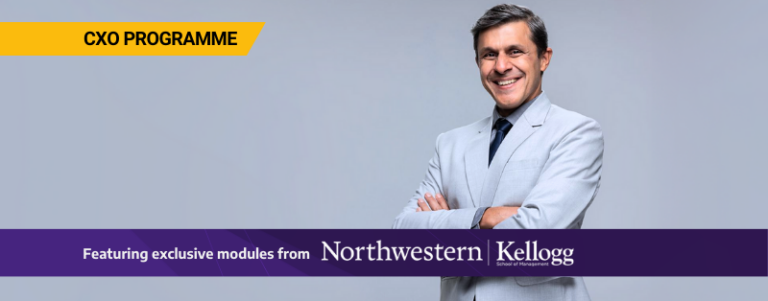Learn Why Ethical Leadership is Essential for Business Growth

- What are the Key Characteristics of Ethical Leadership?
- How Does Ethical Leadership Impact Organizational Performance in the Indian Business Environment?
- How Can Leaders Build Trust and Integrity Within Their Organizations?
- What are the Challenges Faced by Leaders in Practicing Ethical Leadership?
- How Can Organizations Promote Ethical Leadership Among Their Employees?
- How Do Emeritus Courses Equip Leaders to Navigate Ethical Dilemmas and Make Principled Decisions
Dr. Bill Grace, the founder of the Center of Ethical Leadership, propounded the 4-V model of ethical leadership. This model comprises four elements—value, vision, virtue, and voice. It explains what is ethical leadership and why it is important, and how the journey commences when individuals embrace their core values and principles. It embodies developing a vision for the greater good. It also explains that a leader must have a personal voice to communicate his vision and be virtuous and committed to serving the community. Studies suggest a positive relationship between ethical leadership and employee engagement. This is due to employees’ trust in their leaders and opportunities to participate in decision-making processes.
This blog covers the following topics:
- What are the key characteristics of ethical leadership?
- How does ethical leadership impact organizational performance in the Indian business environment?
- How can leaders build trust and integrity within their organizations?
- What are the challenges faced by leaders in practicing ethical leadership?
- How can organizations promote ethical leadership among their employees?
- How do Emeritus courses equip leaders to navigate ethical dilemmas and make principled decisions?
What are the Key Characteristics of Ethical Leadership?
 Before we discuss the characteristics of this further, let’s understand this type of leadership and why it is important.
Before we discuss the characteristics of this further, let’s understand this type of leadership and why it is important.
The ‘ethical leadership’ meaning is simple, it is a concept that explains how leaders follow moral ethics and values while carrying out their day-to-day activities. This concept has both positive and negative connotations. While leaders focus on the importance of moral values, they also influence and inspire their team members to refrain from doing unethical activities.
Ethical leaders play a crucial role in the growth of modern business enterprises by promoting a culture of fairness, integrity, honesty toward work, and transparency. This helps boost productivity and enhances the growth of the organization. Among the notable ethical leadership examples in the modern Indian business world is Dr. Mariazeena Johnson, Chancellor of Sathyabama Institute of Science and Technology. She initiated the Abu Foundation to provide scholarships to meritorious students. Another of those impressive examples in India is Shilpi Dhingra, CEO and Head Interior Designer, Sd Inc. She focuses on environmental conservation.
Let’s now understand the characteristics of ethical leadership:
- They have a sense of respect and value everyeone’s opinions
- Ethical leaders prioritize the common welfare of people. They guide, mentor, and empower their team members to achieve their goals
- Being just and fair is another characteristic trait of ethical leaders; they act in good faith and make fair and honest decisions
- They also practice honesty and trustworthiness by following an ethical code of conduct
Other significant characteristics of ethical leadership include integrity, kindness, dutifulness, cooperation, courage, accountability, discipline, and altruism or selflessness.
How Does Ethical Leadership Impact Organizational Performance in the Indian Business Environment?
1. Increased CSR Expenditure
leadership practices in India encourage businesses to follow fair accounting practices and utilize their profits for CSR activities. In fact, Indian companies spent a total of ₹14,600 crores during the 2022-23 fiscal on CSR activities, thus benefiting society at large.
2. Increased Investment in Sustainable Business Solutions
This leadership style also enhances investment in sustainable business solutions, leading to increased innovation. In essence, it helps create more jobs within organizations and boosts productivity.
3. Better Board Governance
For an organization to effectively follow ethical leadership practices, its board of directors should be the key source of inspiration. Such leadership facilitates diversity and inclusivity on the board. Ultimately, the organization is governed by people with varied skills, experiences, and expertise, and they help an organization grow.
How Can Leaders Build Trust and Integrity Within Their Organizations?
Here are a few tips on how leaders can create a positive work culture and promote trust and integrity within the organization:
- Demonstrate integrity and appropriate behavior to inspire and influence others
- Engage employees in decision-making processes
- Facilitate learning and development within the organization, and encourage employees to upskill
- Set goals that align with the organization’s values, principles, mission, and vision
- Encourage employees to collaborate with their team members on various tasks
- Address conflicts within the organization and aim to resolve them in a fair and amicable manner
ALSO WATCH: How to Become a Successful Leader
What are the Challenges Faced by Leaders in Practicing Ethical Leadership?
1. Slow Financial Growth
The COVID-19 pandemic resulted in an economic downturn, due to which organizations faced massive losses. Businesses are undoubtedly trying to bounce back, but financial growth is still low. This creates a fear of being laid off among employees and hampers their motivation and productivity. It also builds an environment of fear, miscommunication, and distrust. As a result, organizations are unable to successfully follow good leadership practices.
2. Hypercompetitive Business Environment
Another significant challenge in practicing such leadership in India is the fast-changing business trends leading to intense competition in the market. Businesses are trying various strategies to stay ahead of their competitors. This leads to unethical business and management practices. There is also a race internally among employees to climb the corporate ladder as fast as possible, often leading to unethical practices.
3. Relationship With Suppliers/Customers
Organizations in India engage with multiple suppliers and customers who may not follow ethical leadership practices. This negatively impacts the organization’s business. Therefore, many companies nowadays require their suppliers to sign an ethical code of conduct agreement before pursuing business with them. However, all vendors may not agree to it, creating a challenge for organizations to ensure continuous workflow.
ALSO WATCH: 7 Essentials of Leadership
How Can Organizations Promote Ethical Leadership Among Their Employees?
The following are some of the best practices and tips organizations can implement to promote ethical leadership among their employees:
1. Effective Communication
Facilitating clear and free communication within the organization is essential for employees to build trust in their leaders. Effective and transparent communication also increases employee satisfaction and encourages them to follow ethical conduct.
2. Maintaining Organizational Transparency
Another way to promote ethical leadership is to implement commonly-followed best practices to ensure organizational transparency. It makes employees feel valued and sets an example of ethical business conduct. Consequently, it motivates them to follow ethical practices.
3. Encourage and Reward Good Behavior
Organizations can also promote ethical leadership among employees by encouraging and rewarding good behavior in the form of bonuses or awards. They should also acknowledge and appreciate employees adhering to ethical conduct.
4. Practice What You Preach
The leadership team of an organization needs to adhere to ethical leadership principles. This sets an example for the subordinates and inspires them to follow the same ethical behavior. This is called leading by example.
ALSO READ: Creating Ethical Behaviour in the Workplace
How Do Emeritus Courses Equip Leaders to Navigate Ethical Dilemmas and Make Principled Decisions
Emeritus leadership courses teach professionals what is ethical leadership and help them understand and acquire traits of popular ethical leaders. The courses also train professionals on how they can promote an ethical leadership culture within their organization by overcoming various challenges. This is done through numerous case studies and practical training sessions conducted by industry leaders. Explore the wide range of Emeritus’ online leadership courses and advance your career by upskilling in the right direction.
By Sneha Chugh
Write to us at content@emeritus.org

































